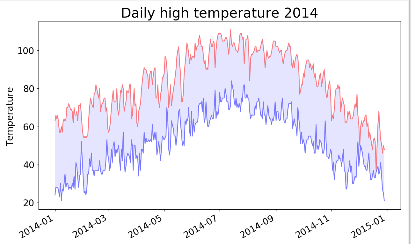lows_highs.py
import csv
from matplotlib import pyplot as plt
from datetime import datetime
filename='death_valley_2014.csv'
with open(filename) as f:
reader=csv.reader(f)
header_row=next(reader)
highs=[]
dates=[]
lows=[]
for row in reader:
try:
current_date=datetime.strptime(row[0],"%Y-%m-%d")
high=int(row[1])
low=int(row[3])
except ValueError:
print(current_date,'missing date')
else:
dates.append(current_date)
highs.append(high)
lows.append(low)
fig=plt.figure(dpi=128,figsize=(10,6))
plt.plot(dates,highs,c='red',alpha=0.5)
plt.plot(dates,lows,c='blue',alpha=0.5)
plt.fill_between(dates,highs,lows,facecolor='blue',alpha=0.1)
plt.title("Daily high temperature 2014",fontsize=24)
plt.xlabel('',fontsize=16)
fig.autofmt_xdate()
plt.ylabel("Temperature ",fontsize=16)
plt.tick_params(axis='both',which='major',labelsize=16)
plt.show()
最后
以上就是诚心黑裤最近收集整理的关于天气数据处理,缺失值异常处理的全部内容,更多相关天气数据处理内容请搜索靠谱客的其他文章。
本图文内容来源于网友提供,作为学习参考使用,或来自网络收集整理,版权属于原作者所有。








发表评论 取消回复